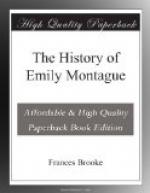Adieu! my letter is called for. I will write to you again in a few days.
Yours,
Ed.
Rivers.
Major Melmoth tells me, they are to be married in a month at Quebec, and to embark immediately for England. I will not be there; I cannot bear to see her devote herself to wretchedness: she will be the most unhappy of her sex with this man; I see clearly into his character; his virtue is the meer absence of vice; his good qualities are all of the negative kind.
LETTER 19.
To Miss Fermor, at Silleri.
Montreal, Sept. 24.
I have but a moment, my dear, to acknowledge your last; this week has been a continual hurry.
You mistake me; it is not the romantic passion of fifteen I wish to feel, but that tender lively friendship which alone can give charms to so intimate an union as that of marriage. I wish a greater conformity in our characters, in our sentiments, in our tastes.
But I will say no more on this subject till I have the pleasure of seeing you at Silleri. Mrs. Melmoth and I come in a ship which sails in a day or two; they tell us, it is the most agreeable way of coming: Colonel Rivers is so polite, as to stay to accompany us down: Major Melmoth asked Sir George, but he preferred the pleasure of parading into Quebec, and shewing his fine horses and fine person to advantage, to that of attending his mistress: shall I own to you that I am hurt at this instance of his neglect, as I know his attendance on the general was not expected? His situation was more than a sufficient excuse; it was highly improper for two women to go to Quebec alone; it is in some degree so that any other man should accompany me at this time: my pride is extremely wounded. I expect a thousand times more attention from him since his acquisition of fortune; it is with pain I tell you, my dear friend, he seems to shew me much less. I will not descend to suppose he presumes on this increase of fortune, but he presumes on the inclination he supposes I have for him; an inclination, however, not violent enough to make me submit to the least ill treatment from him.
In my present state of mind, I am extremely hard to please; either his behaviour or my temper have suffered a change. I know not how it is, but I see his faults in a much stronger light than I have ever seen them before. I am alarmed at the coldness of his disposition, so ill suited to the sensibility of mine; I begin to doubt his being of the amiable character I once supposed: in short, I begin to doubt of the possibility of his making me happy.
You will, perhaps, call it an excess of pride, when I say, I am much less inclined to marry him than when our situations were equal. I certainly love him; I have a habit of considering him as the man I am to marry, but my affection is not of that kind which will make me easy under the sense of an obligation.




